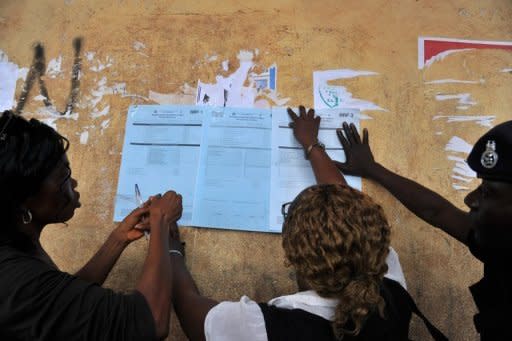Calls for calm as Sierra Leone braces for poll results
Sierra Leone political parties urged calm on Sunday as the nation braced for results after a peaceful day of voting in polls seen as a litmus test of the west African nation's post-war recovery. Observers and political parties have widely praised a well-organised and peaceful election in Sierra Leone's third vote since the end of a brutal 11-year civil war fought by rebels armed by money from "blood diamonds". UN Secretary General Ban Ki-moon on Sunday added his congratulations for the "peaceful and largely orderly elections", his office said in a statement. "The high voter turnout and the remarkable calm displayed by the country’s citizens as they cast their votes are a clear manifestation of their desire for peace, democracy and development," it said. As unofficial results trickled in throughout the night, locals crowded around crackling radios, sending cheers erupting sporadically across communities in the verdant seaside capital of Freetown. The presidential, parliamentary and local polls have been wholly organised by the government for the first time since the end of the war in 2002, although it has still received significant donor funding. Nine parties are contesting the presidential election, seen as a two-horse race between incumbent Ernest Koroma and ex-military leader Julius Maada Bio -- one of whom will become both head of state and government. The biggest test for the country will be for one of the two main parties that have moved in and out of power since independence from Britain in 1967 to accept defeat. Sumana Kapeh, deputy chairman of Bio's Sierra Leone People's Party (SLPP) urged supporters to "remain calm and wait for the official results to be announced". Leonard Koroma, national campaign coordinator for the ruling All People's Congress, noted that unofficial results showed a lead by his party, which had made inroads in traditional opposition strongholds in the east of the country. "With the provisional results being announced it looks good for the APC. The polls were remarkable with no reported cases of violence. All supporters of the APC should stay calm," he said. -- Waiting for peace to bring prosperity -- Richard Howitt, head of a European Union observer mission, urged a speedy announcement of results to avoid potential violence. "At this stage the integrity (of the count) appears to be very high," he told AFP. "A lot of people have said they are very concerned about reactions as results become known and that could be a flashpoint in terms of potential conflict between rival groups of supporters. "I am concerned an undue delay in results being announced could risk conflict in a society where rumour plays a big role. There are some risks at the moment for Sierra Leone." Previous elections in 2002 and 2007 were marred by pockets of violence. The 2007 election however saw a peaceful transfer of power between the opposition and ruling party when Koroma won in a second round. Now, a decade after the end of a war synonymous with feared rebel leaders armed through the sale of "blood diamonds", Sierra Leone has become accustomed to peace. The concerns of most voters are development, prosperity, improved access to education and health care, and greater employment opportunities. The incoming government will be tasked with stewardship of a lucrative windfall from a boom in the country's mining industry, notably iron-ore, and possible oil production. Though still one of the world's poorest countries, Sierra Leone is rich in mineral resources and massive iron-ore stores are expected to add 21 percent growth this year to its $2.2 billion (1.7 billion euro) gross domestic product, the International Monetary Fund estimates. If well-managed, these resources could change the fortunes of a nation which has one of Africa's lowest life expectancies at 47 years, according to the World Bank, and highest rates of maternal mortality. Youth unemployment levels hover at 60 percent. Koroma has ushered in significant investment, and construction is taking place all over the capital, with roads newly-resurfaced and electricity supply more stable. He is regarded as the favourite, but it is unclear whether he will reach the 55 percent of votes needed to avoid a run-off. Parliamentary candidates simply need the most votes in one round of voting. Bio, a 48-year-old retired brigadier with a murky past as the brief head of a military junta in 1996, has amassed significant support, especially amongst the youth.




